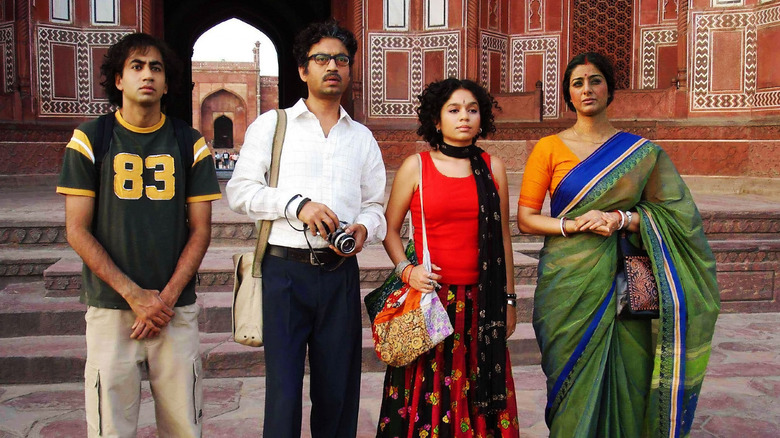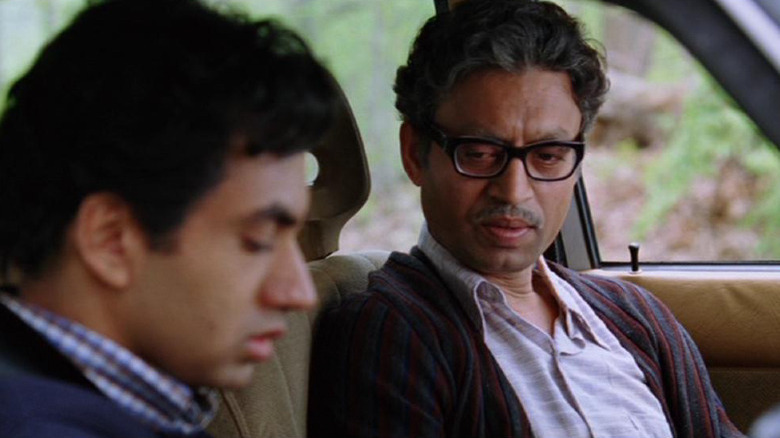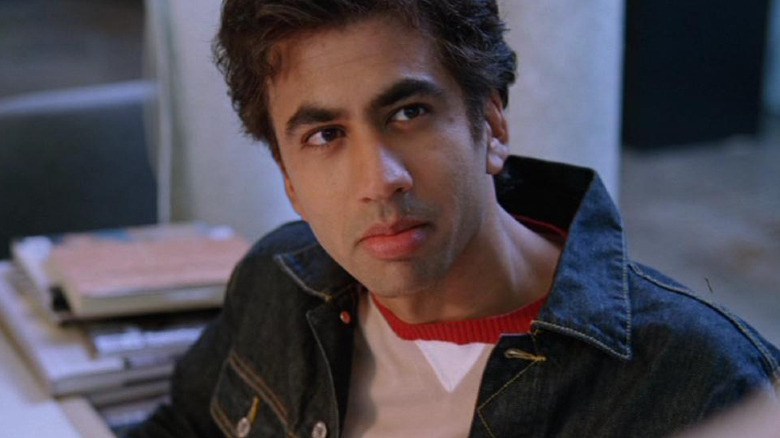Mira Nair Was Uniquely Prepared To Bring The Namesake To The Big Screen
There are two great films in which Kal Penn plays a pot-smoker who rebels against leading a life his parents would readily approve of. One of them is 2004's "Harold & Kumar Go to White Castle," and the other is 2006's "The Namesake," based on the 2003 novel by Pulitzer Prize winner Jhumpa Lahiri. It was Penn's "Harold & Kumar" co-star, John Cho, who put him on the path to starring in the latter, which is really only testament to the influential power of 2000s stoner cinema. But I digress.
Penn stars in "The Namesake" as Nikhil "Gogol" Ganguli (more on the "Gogol" part later). His parents, Ashoke and Ashima (Irrfan Khan and Tabu), immigrated from Calcutta to New York when they were younger, hoping to begin a new life and raise a family. Like the characters in other stories of first-generation immigrants and their kids, Ashoke, Ashima, and Gogol must each find their way in one world while being pulled toward another. It's a theme director Mira Nair had explored in earlier films (such as 1991's "Mississippi Masala"), which made her a natural fit to turn "The Namesake" into a movie.
As it turned out, however, Lahiri's story held a special personal meaning for Nair. As she told told Emanuel Levy in 2007:
"Here was the story of a young girl [Ashima] who traveled from Calcutta and wound up in New York City, which is almost precisely the same road I traveled. I thought it was a deeply human story about the millions of us in America who have left one home for another and learned what it truly means to combine the old with the new."
What's in a name?
In "The Namesake," Gogol gets his name — which was meant to be a family nickname before a misunderstanding led to it becoming his legal name — from the 19th century Russian author Nikolai Gogol. The film opens with a younger Ashoke aboard a train reading Nikolai Gogol's most influential short story, "The Overcoat," in a collection of his works. Published in 1842, the story centers on a hardworking, financially poor Russian clerk, Akaky, who saves up money to buy a new overcoat, believing it will bring him the respect he has long been denied by his peers.
The multicultural nature of Gogol's name and the way he comes to resent it speaks to the conflict at the heart of "The Namesake." It's a struggle Mira Nair is familiar with, having been born in Rourkela, Orissa, India, and educated at Harvard College after initially enrolling at Delhi University's Miranda House. This was yet another factor that inspired her to adapt "The Namesake," all the more so after dealing with the painful death of a loved one (as Gogol and his family eventually do). Speaking to Emmanuel Levy, Nair explained:
"I think out of all my films, 'The Namesake' is probably the most personal. When I read Jhumpa's book it was like I had just met a person who completely understood my grief, who knew the cocoon I was in and everything I was experiencing and I told myself that I must buy the rights immediately."
Bringing two worlds together
For as much as Ashoke clearly relates to Akaky's search for a better life in "The Overcoat," the story holds a far more specific meaning to him in "The Namesake." As he explains to Gogol once he's grown up, Ashoke was in a horrible train derailment when he was younger, having only survived thanks to the medics who spotted him clutching a bloodied page from his collection of Nikolai Gogol's writing. It's a revelation that not only shakes Nikhil to his core, it also pushes him in the direction of finally uniting the dual aspects of his cultural and ethnic heritage.
In similar ways, Mira Nair saw "The Namesake" as a chance to paint a unified and stirring portrait of both New York and Calcutta on the big screen, capturing what these places means to her personally:
"I saw an opportunity to unite these two equally exciting worlds that I know and love and have lived in all my life. I also wanted to capture visually the dizzying feeling of being an immigrant where you might physically be in one particular space yet you feel like you are someplace else in your soul."
Nair's producing partner, Lydia Dean Pilcher, agreed with that sentiment:
"It was obviously a piece that really spoke to Mira, very deeply and in a personal way. This was clear even in the urgency she felt to make this project happen right away. It was great material for her, because Mira has such a rare ability to take a very specific story and open it up into a universal story that everyone can relate to and take something from."
Adapting the story to film
Jhumpa Lahiri's novel doesn't easily lend itself to a movie adaptation. It takes place over multiple decades and on different sides of the pond, its focus gradually shifting from Ashoke and Ashima to Gogol (and let's not forget his sister Sonia, played by Sahira Nair in the film version). But as Lahiri told Emmanuel Levy, it was Mira Nair's personal connection to and passion for her source material that won her over:
"I don't think I would have been interested in making the movie if it were for any other director. But I have so much admiration for Mira and the journey she's made as a filmmaker in this country, bringing out the Indian experience in such a fresh and innovative way. I really see her as a pioneer. She's so passionate that she swept me and my entire family along in this film!"
Nair worked closely with writer Sooni Taraporevala on the script for "The Namesake," often exchanging notes so as to better "expand on the more humorous and poignant scenes in the book." In time, Lahiri's skepticism washed away:
"I really didn't believe that my book could be translated into film. There's so much description and summary — but Mira and Sooni had read the book so carefully they were able to coax out the dialogue and action that is implicit. I could never have done this as the writer of the novel, but I thought what they did worked remarkably well."
She's not the only one who feels that way, either, as evidenced by the film's glowing critical reception. As Roger Ebert noted in his own positive review: "'The Namesake' is Mira Nair's ninth feature, and I suspect the one closest to her heart."



